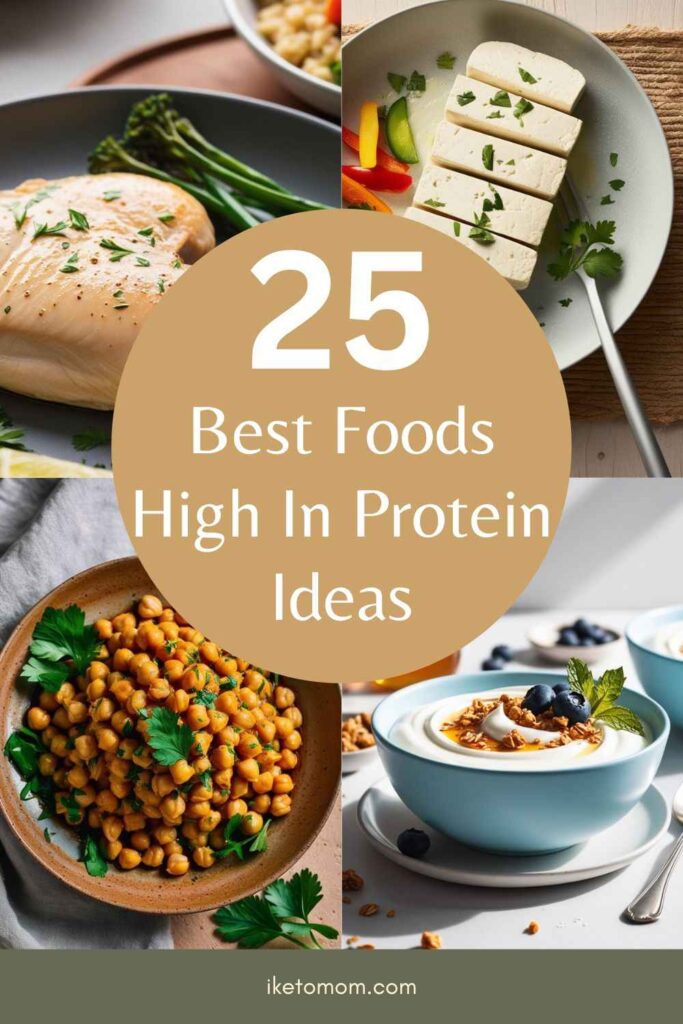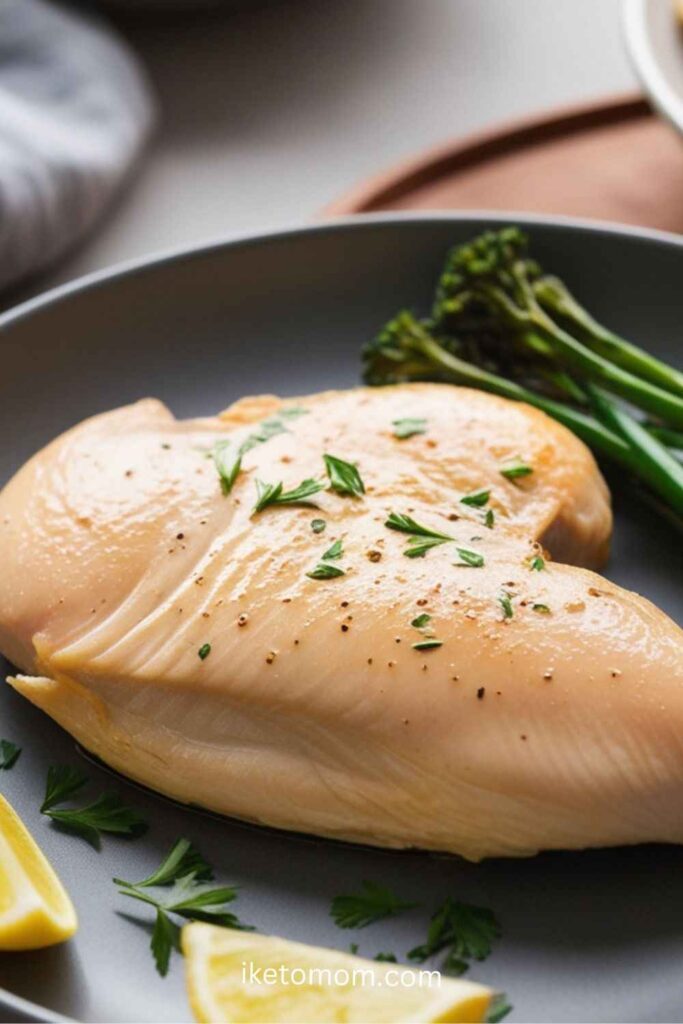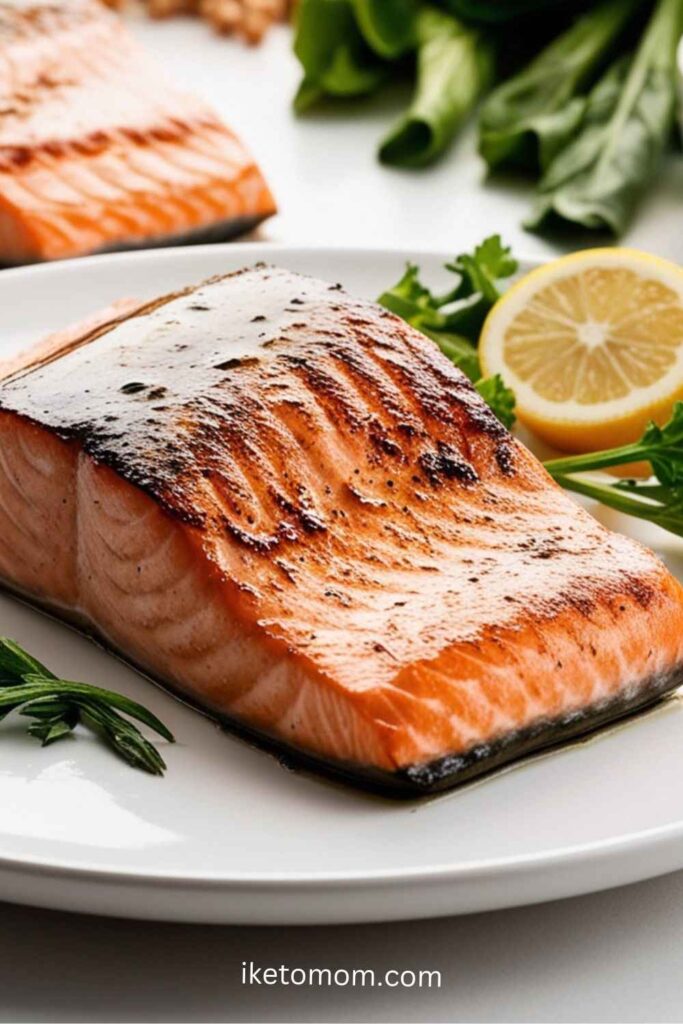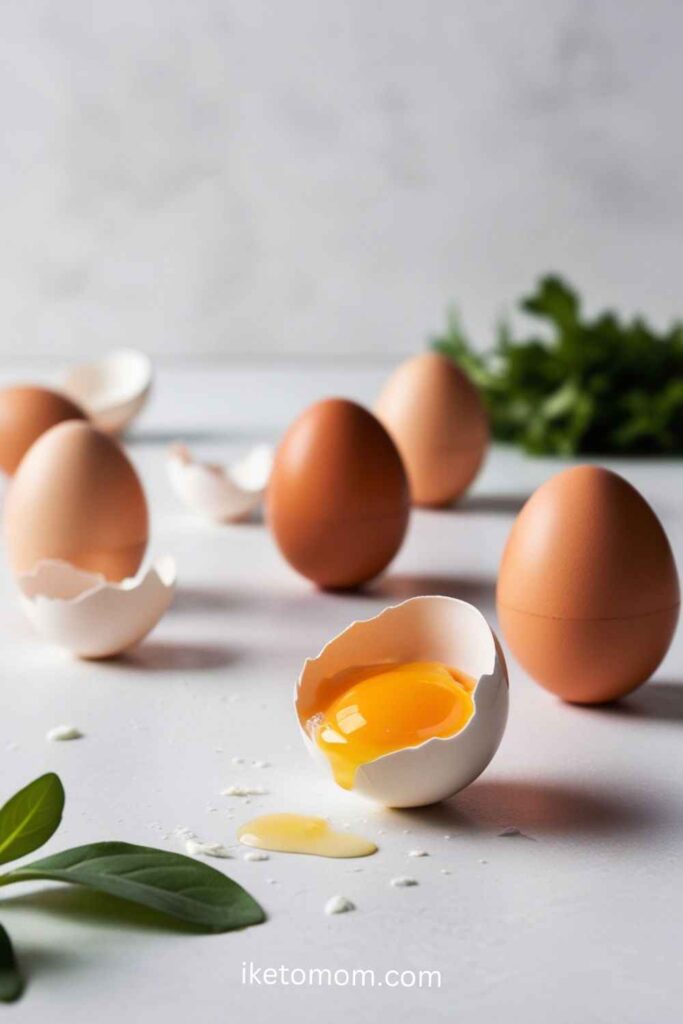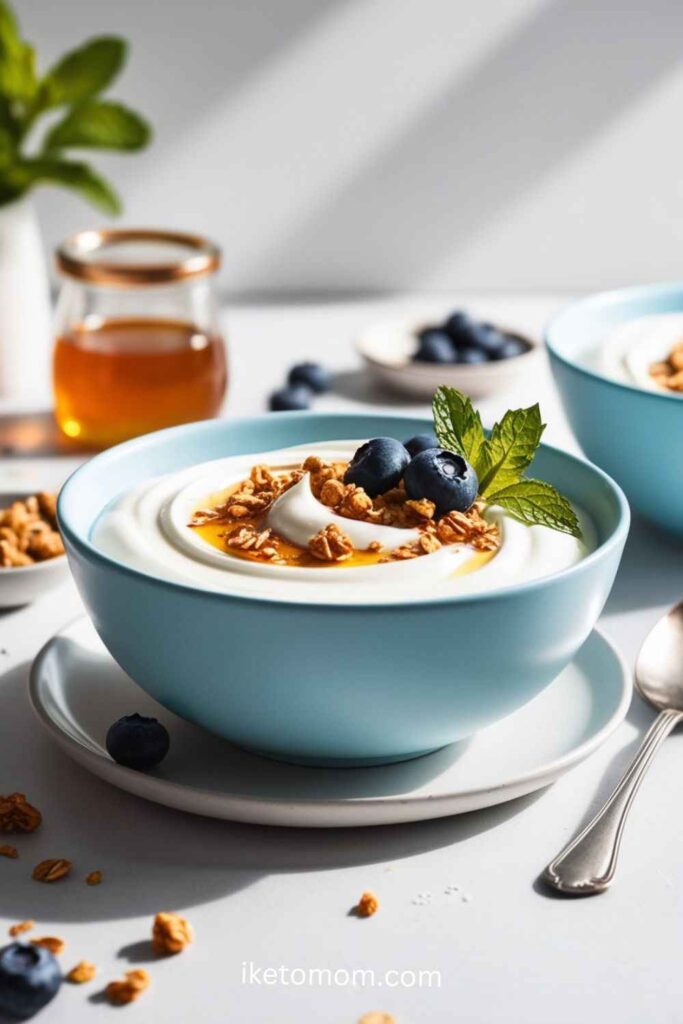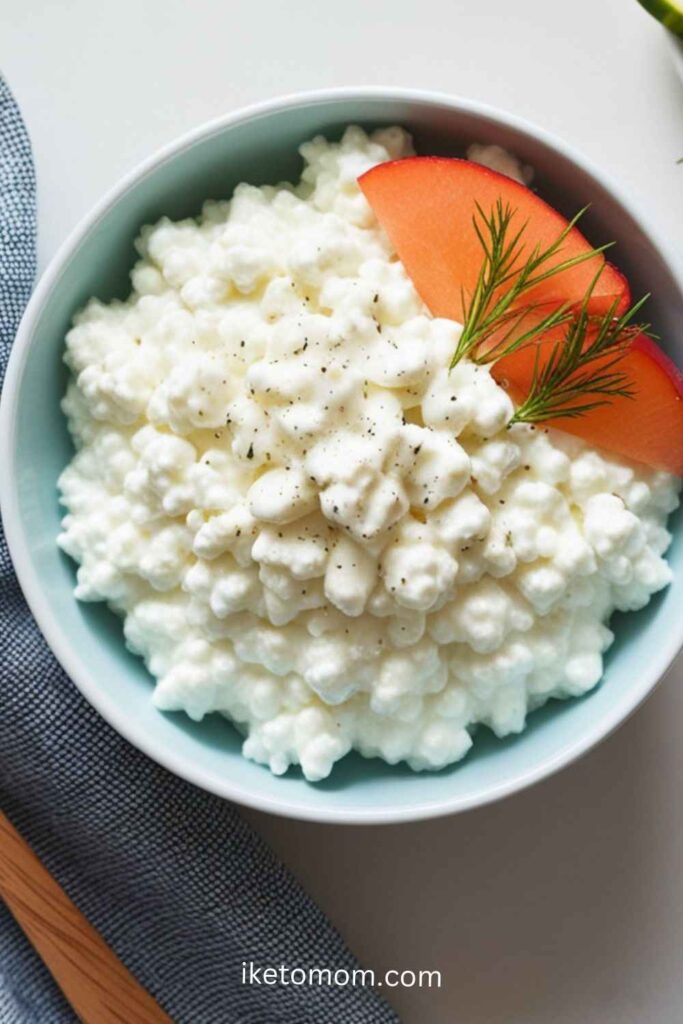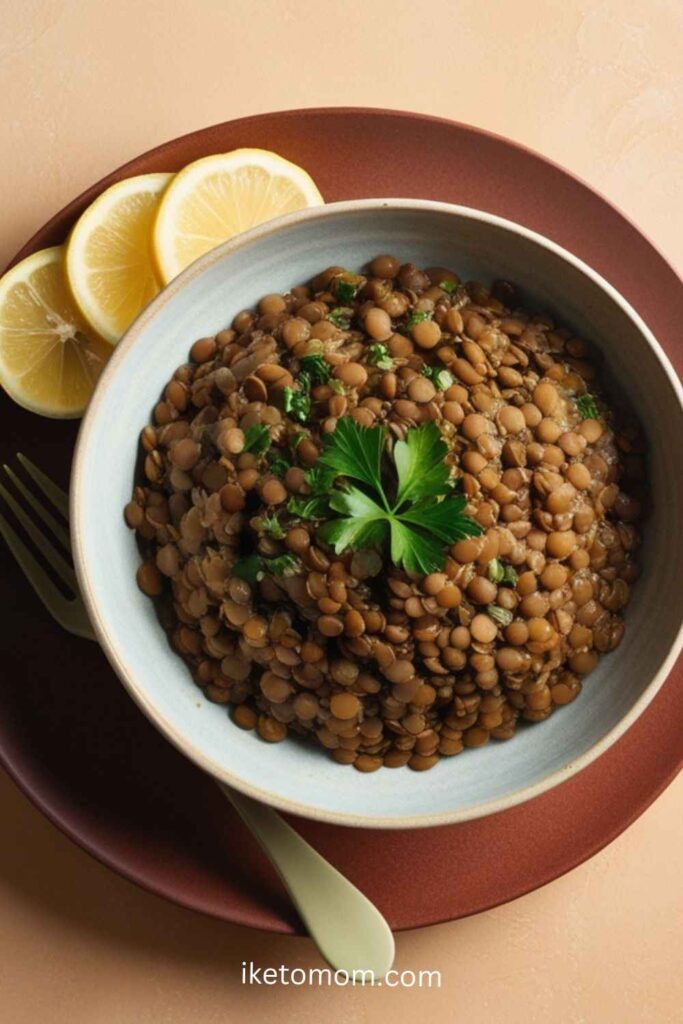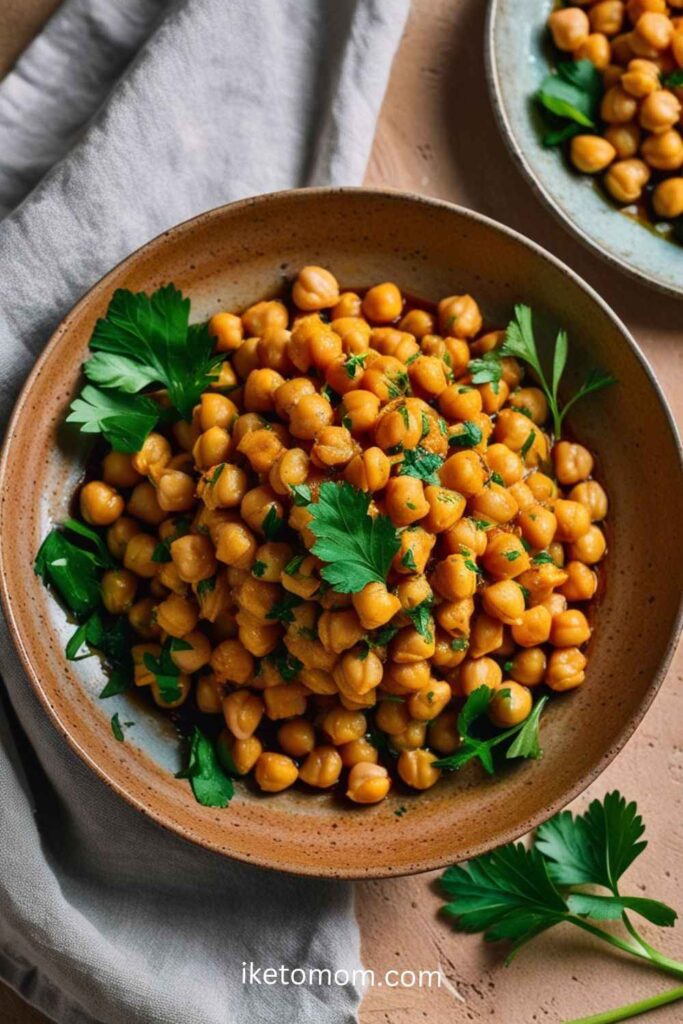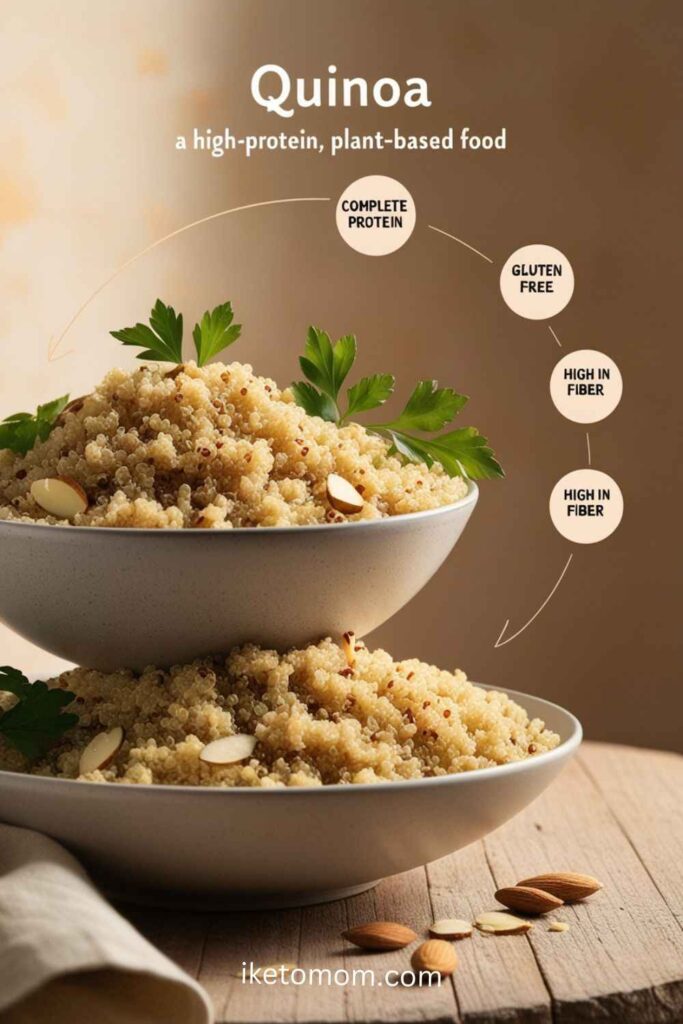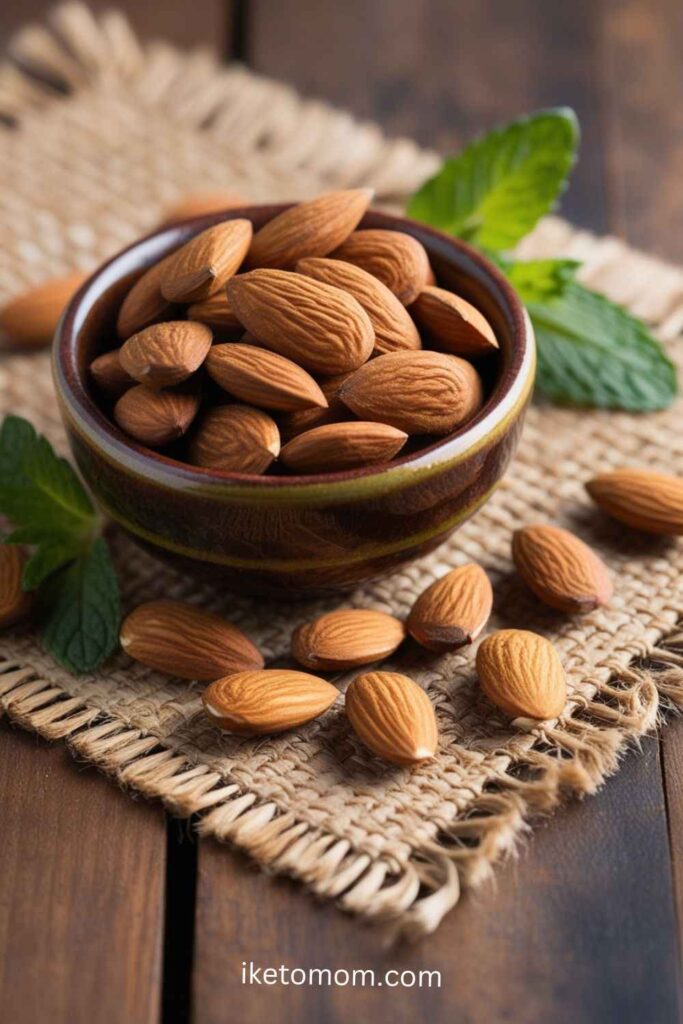Foods High In Protein Ideas
1. Chicken Breast
Chicken breast is one of the most popular and widely consumed sources of protein, particularly for those looking to build or maintain lean muscle mass. It’s known for its versatility in the kitchen, as it can be grilled, baked, sautéed, or added to a variety of dishes such as salads, sandwiches, and stir-fries.
Nutrition Information: A 100-gram serving of chicken breast contains approximately 31 grams of protein, making it an excellent source of high-quality, lean protein. It is also low in fat, particularly when skinless, with only about 3-4 grams of fat per 100 grams, making it a great choice for those aiming to increase protein intake while keeping fat consumption low.
Health Benefits:
- Muscle Growth and Recovery: The high protein content in chicken breast is essential for muscle repair and growth. Protein provides the building blocks (amino acids) necessary to rebuild muscle tissue after exercise, which is why it’s a staple in post-workout meals.
- Lean Protein Source: Chicken breast is considered a lean protein, meaning it’s low in fat and calories while providing a significant amount of protein. This makes it ideal for those looking to maintain a healthy body composition or those on calorie-controlled diets.
- Versatility: Beyond its health benefits, chicken breast is easy to prepare and can be incorporated into countless recipes. From grilling and baking to stir-fries and soups, it can be seasoned and cooked in a variety of ways to suit different tastes and dietary preferences.
Incorporating chicken breast into your meals regularly can help support muscle building, aid in weight management, and provide essential nutrients for overall health.
2. Salmon
Salmon is a nutrient-dense fish renowned not only for its high protein content but also for its abundance of heart-healthy fats. It’s widely recognized as one of the best sources of omega-3 fatty acids, which are essential for overall health.
Nutrition Information: A 100-gram serving of salmon contains around 25 grams of protein, making it an excellent choice for those looking to boost their protein intake. It is also rich in healthy fats, particularly omega-3 fatty acids, which are known for their anti-inflammatory properties and heart health benefits.
Health Benefits:
- Supports Heart Health: The omega-3 fatty acids found in salmon are beneficial for reducing inflammation, lowering blood pressure, and improving cholesterol levels, all of which contribute to a healthier cardiovascular system. Regular consumption of omega-3-rich foods like salmon has been linked to a reduced risk of heart disease.
- Muscle Maintenance: In addition to its protein content, which aids in muscle recovery and growth, the healthy fats in salmon support muscle function and overall strength. Protein, combined with omega-3s, provides a complete package for both muscle maintenance and performance.
- High-Quality Protein: Salmon offers a high-quality, complete protein, containing all nine essential amino acids. This makes it an excellent choice for anyone looking to meet their daily protein needs, particularly for athletes, bodybuilders, or those following a balanced diet.
Salmon can be prepared in various ways—grilled, baked, or even enjoyed raw as sushi—making it a delicious and versatile food to include in your diet for both its flavor and health benefits.
3. Eggs
Eggs are a powerhouse food, offering a remarkable combination of protein, vitamins, and minerals that make them a staple in many diets. They are considered a complete protein source because they contain all nine essential amino acids, making them highly effective in supporting muscle repair and overall health.
Nutrition Information: Each large egg contains around 6 grams of high-quality protein. While eggs are a great protein source, they are also packed with nutrients, offering a wide array of vitamins and minerals. They are particularly rich in vitamin B12, which plays a crucial role in red blood cell formation and maintaining a healthy nervous system. Eggs are also a great source of choline, an essential nutrient that supports brain health and liver function.
Health Benefits:
- Complete Protein Source: Eggs provide a balanced profile of amino acids, making them an ideal protein choice for building and repairing muscles. Their high protein content can also help with satiety, aiding in weight management and controlling hunger.
- Rich in Vitamins and Minerals: In addition to protein, eggs are packed with vital nutrients. Vitamin B12 helps with energy production and nerve function, while choline is essential for brain health, liver function, and fetal development during pregnancy.
- Versatile and Affordable: Eggs are easy to prepare and can be incorporated into many different meals—whether boiled, scrambled, poached, or added to baking or salads. They’re also an affordable source of nutrition, making them accessible for most people.
Including eggs in your diet can provide a simple, nutritious, and cost-effective way to meet your daily protein needs while benefiting from their wide array of essential vitamins and minerals.
4. Greek Yogurt
Greek yogurt is a creamy, nutrient-packed dairy product that stands out for its high protein content and probiotic benefits. It has become a favorite for people seeking a healthy snack or a versatile addition to various dishes, such as smoothies, parfaits, or salads.
Nutrition Information: Greek yogurt offers about 10 grams of protein per 100 grams, which is significantly higher than regular yogurt. The protein in Greek yogurt is primarily casein, which digests slowly, helping to keep you feeling full longer. It is also lower in sugar compared to traditional yogurt, making it a healthier option for those watching their sugar intake.
Health Benefits:
- Contains Probiotics: Greek yogurt is rich in probiotics, which are beneficial bacteria that support gut health. These probiotics help to maintain a healthy balance of gut flora, which can improve digestion, enhance immune function, and even support mental health by reducing inflammation.
- Promotes Gut Health: The probiotics in Greek yogurt help to regulate digestion and promote a healthy digestive tract. Regular consumption can aid in the prevention of issues like bloating, constipation, and irritable bowel syndrome (IBS).
- Ideal for Snacks or Smoothies: Due to its creamy texture and mild flavor, Greek yogurt is perfect for quick snacks or as a base for smoothies. It can be paired with fruits, nuts, seeds, or honey for a balanced, protein-packed treat that supports muscle recovery and overall health.
Incorporating Greek yogurt into your diet offers an easy way to increase protein intake while benefiting from the digestive and immune-boosting properties of probiotics. Whether enjoyed alone or as part of a meal, it’s a delicious and versatile option for health-conscious individuals.
5. Cottage Cheese
Cottage cheese is a dairy product that is both rich in protein and low in fat, making it an excellent choice for anyone looking to build muscle, lose weight, or simply maintain a balanced diet. It’s especially popular among athletes and fitness enthusiasts for its high casein protein content, which digests slowly, providing a steady release of amino acids.
Nutrition Information: A 100-gram serving of cottage cheese contains around 11 grams of protein, making it one of the top protein-rich dairy options. It’s also low in fat, particularly in the fat-free or low-fat varieties, and contains important vitamins and minerals like calcium, phosphorus, and vitamin B12.
Health Benefits:
- High Casein Protein Content: Cottage cheese is rich in casein, a slow-digesting protein that is ideal for muscle recovery and repair, making it a great choice for a bedtime snack to fuel overnight muscle growth.
- Great for Muscle Recovery: Due to its high protein content, cottage cheese helps in rebuilding muscle tissue and supporting muscle maintenance, especially after workouts or strenuous physical activity.
- Weight Management: The combination of high protein and low fat in cottage cheese can aid in weight management by helping you feel fuller for longer, reducing overall calorie consumption.
Cottage cheese is a versatile, nutrient-packed food that can be eaten on its own, mixed with fruit, or used in recipes ranging from savory dishes to desserts. It’s an ideal addition to any diet, whether for muscle growth, weight management, or general health.
6. Lentils
Lentils are a nutritious, plant-based food that provides a significant amount of protein, making them an excellent choice for vegetarians, vegans, or anyone looking to reduce their meat intake. These small legumes are not only high in protein but also packed with fiber, iron, and other essential nutrients, offering a variety of health benefits.
Nutrition Information: A 100-gram serving of cooked lentils contains approximately 9 grams of protein. While they may not provide as much protein as animal-based sources, they are still an excellent plant-based option that is versatile and easy to include in meals.
Health Benefits:
- High in Fiber: Lentils are rich in dietary fiber, with 100 grams of cooked lentils providing around 8 grams of fiber. This helps with digestion, supports gut health, and promotes feelings of fullness, which can aid in weight management.
- Iron-Rich: Lentils are an excellent source of non-heme iron, which is essential for producing red blood cells and transporting oxygen throughout the body. This makes them particularly beneficial for vegetarians and vegans, who may need to rely on plant-based iron sources.
- Great Plant-Based Protein Source: Lentils provide a complete protein, making them a fantastic alternative to meat for vegetarians and vegans. They are also low in fat and calories, making them ideal for anyone looking to maintain a balanced diet.
Lentils are incredibly versatile and can be used in a variety of dishes, such as soups, stews, salads, or even as a meat substitute in burgers or tacos. Including lentils in your diet can help you meet your protein and fiber needs while supporting heart health and overall wellness.
7. Tofu
Tofu, also known as bean curd, is a popular plant-based protein that serves as an excellent alternative to meat, especially for vegetarians and vegans. Made from soybeans, tofu is a versatile food that can absorb the flavors of the ingredients it’s cooked with, making it ideal for a wide variety of dishes.
Nutrition Information: A 100-gram serving of tofu contains about 8 grams of protein, making it a solid protein source, particularly for those on a plant-based diet. It’s also rich in important minerals like calcium and iron, which are essential for bone health and oxygen transport in the blood.
Health Benefits:
- Plant-Based Protein: Tofu is a great source of plant-based protein, which is important for building and repairing muscles, especially for those who avoid animal products. It provides a complete set of amino acids, making it a high-quality protein option.
- Rich in Calcium and Iron: Many types of tofu are fortified with calcium, supporting bone health. Additionally, the iron content in tofu helps in the production of hemoglobin, which transports oxygen throughout the body.
- Versatile for Various Dishes: Tofu can be used in savory or sweet dishes, from stir-fries and curries to smoothies and desserts. Its ability to absorb different flavors makes it a flexible ingredient for a wide range of recipes, especially for vegetarians and vegans looking for a nutritious protein option.
Tofu is an excellent addition to a balanced diet, offering plant-based protein, important minerals, and versatility in cooking. Whether grilled, sautéed, or blended, tofu can be incorporated into meals for a nutritious boost.
8. Chickpeas
Chickpeas, also known as garbanzo beans, are a highly nutritious legume that packs a significant amount of protein along with fiber and essential nutrients. They are a versatile ingredient used in a variety of dishes, from hummus and salads to soups and stews.
Nutrition Information: A 100-gram serving of cooked chickpeas contains around 8 grams of protein, making them an excellent source of plant-based protein. They are also high in fiber, with approximately 7-8 grams per 100 grams, which helps support healthy digestion.
Health Benefits:
- Aids Digestion: Chickpeas are rich in fiber, which plays a crucial role in promoting digestive health. Fiber helps regulate bowel movements, prevent constipation, and maintain a healthy gut microbiome.
- Protein-Rich: As a plant-based protein source, chickpeas are perfect for vegetarians and vegans looking to meet their protein needs. They provide essential amino acids that help with muscle repair, growth, and overall health.
- Versatile in Meals: Chickpeas can be incorporated into a wide range of dishes. Whether blended into hummus, added to salads, tossed into stews, or roasted as a crunchy snack, they are an incredibly versatile food that can be enjoyed in numerous ways.
Chickpeas are a nutritious, fiber-rich food that can help support digestive health while providing plant-based protein. They are a great addition to any diet and are perfect for adding texture and nutrition to a variety of meals.
9. Quinoa
Quinoa is a popular pseudo-grain that is known for its impressive nutritional profile. Often touted as a superfood, it is a rare plant-based complete protein, meaning it contains all nine essential amino acids that the body cannot produce on its own. This makes quinoa an excellent choice for vegetarians, vegans, or anyone looking for a nutritious and versatile protein source.
Nutrition Information: A 100-gram serving of cooked quinoa provides approximately 4 grams of protein. While the protein content is slightly lower compared to some animal-based proteins, quinoa is considered a complete protein, making it a valuable option for meeting your daily protein requirements. It’s also high in fiber and magnesium, which contributes to digestive health and overall well-being.
Health Benefits:
- Complete Protein: Quinoa is one of the few plant-based foods that contains all nine essential amino acids, making it an ideal protein choice for anyone following a plant-based diet or looking to diversify their protein sources.
- Rich in Magnesium: Quinoa is an excellent source of magnesium, which supports muscle function, bone health, and energy production. Magnesium also plays a role in regulating blood sugar levels and reducing inflammation.
- High in Fiber: Quinoa is rich in fiber, which helps promote healthy digestion, regulate blood sugar, and support heart health. Fiber also contributes to feeling full longer, making it a good option for weight management.
Quinoa can be used in a variety of dishes, from salads and bowls to soups and even as a substitute for rice or couscous. Its nutty flavor and fluffy texture make it a great addition to a balanced, protein-rich diet.
10. Almonds
Almonds are not only a rich source of protein but also packed with healthy fats and essential nutrients, making them a popular and convenient snack for those looking to fuel their body with energy and support muscle repair.
Nutrition Information: A 100-gram serving of almonds contains approximately 21 grams of protein, which is relatively high compared to other nuts. They are also rich in healthy monounsaturated fats, which promote heart health, and provide a good amount of fiber (about 12 grams per 100 grams), which supports digestion and satiety. Additionally, almonds are high in vitamin E, a powerful antioxidant that helps protect cells from oxidative stress.
Health Benefits:
- Muscle Repair and Energy: The combination of protein and healthy fats in almonds makes them an ideal snack for muscle repair and sustained energy levels. The protein helps rebuild muscle tissue, while the healthy fats provide a long-lasting source of energy.
- Heart Health: Almonds are rich in monounsaturated fats, which are known to support healthy cholesterol levels and reduce the risk of heart disease. They also contain magnesium, which is beneficial for heart function.
- Nutrient-Dense Snack: Packed with vitamins, minerals, and fiber, almonds make for a nutrient-dense snack that can keep you feeling full longer, helping with weight management and providing a steady supply of energy throughout the day.
Almonds can be enjoyed on their own, added to smoothies, sprinkled over salads, or used in baking, making them a versatile addition to any diet.
FAQ
1. What are some common foods high in protein?
Common foods high in protein include chicken breast, salmon, eggs, Greek yogurt, cottage cheese, quinoa, lentils, tofu, edamame, and beef jerky. These foods provide a good balance of protein to support muscle growth, weight loss, and overall health.
2. How much protein should I consume daily?
The recommended daily protein intake varies depending on factors such as age, gender, activity level, and overall health. On average, adults should aim for about 0.8 grams of protein per kilogram of body weight. Athletes or individuals aiming to build muscle may need more, around 1.2–2.0 grams per kilogram.
3. What are the benefits of eating high-protein foods?
High-protein foods are essential for muscle repair and growth, weight management, and overall health. Protein helps to keep you full longer, supports metabolism, promotes healthy skin and hair, and aids in immune function. It is especially important for athletes and those engaged in physical training.
4. Can I get enough protein on a plant-based diet?
Yes! Many plant-based foods are excellent sources of protein, such as lentils, quinoa, tofu, chickpeas, edamame, and nuts. By incorporating a variety of these foods into your diet, you can easily meet your protein needs without consuming animal products.
5. What are some high-protein snacks?
Some high-protein snack options include Greek yogurt, cottage cheese, hard-boiled eggs, protein bars, beef jerky, roasted chickpeas, and edamame. These snacks are convenient and packed with protein, making them ideal for a quick energy boost.

I’m Priscilla Swahn, a registered dietitian with a master’s degree in nutritional sciences. With over a decade of experience in holistic nutrition, I specialize in creating delicious keto recipes to help you enjoy a healthy lifestyle. On iKetoMom, you’ll find a variety of recipes for every meal—hearty breakfasts, satisfying lunches, mouthwatering dinners, indulgent desserts, and refreshing drinks. My recipes make keto living easy and enjoyable for the whole family. Featured in EatingWell and MindBodyGreen, I also collaborate with health centers and corporate companies to share my expertise. Join me and discover the joy of keto cooking!

